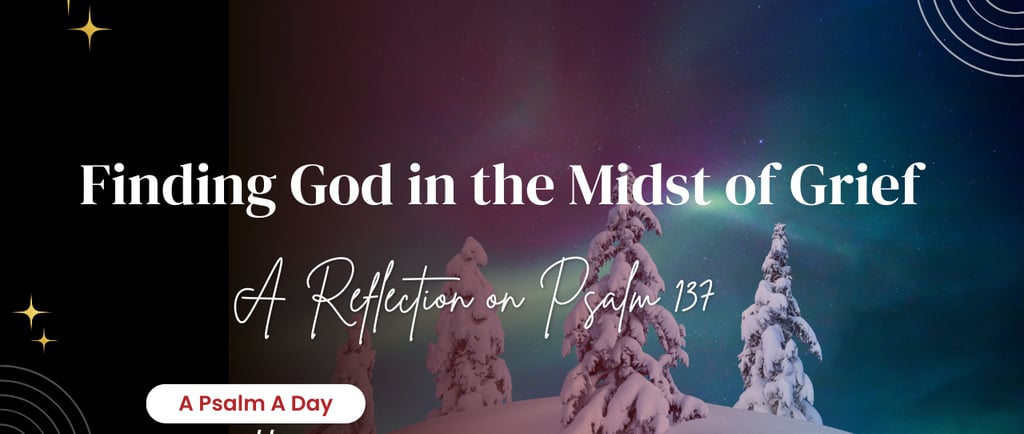Purchase Your WorkBook Today!
Day 352 Finding God in the Midst of Grief – A Reflection on Psalm 137
Psalm 137 invites us to be real with God—to grieve, to wrestle, and to trust Him with our pain. In a world that feels increasingly foreign and full of distractions, we can find our true home in Him.
3 min read


Finding God in the Midst of Grief
by Torrie Slaughter
Psalm 137 is one of the most poignant and emotionally charged psalms in the Bible. It captures the raw grief, anger, and longing of a people torn from their homeland and forced to live in exile. This psalm gives us permission to express deep, honest emotions before God while pointing us to the hope of His ultimate justice and restoration.
The Pain of Exile
The psalm begins with a powerful image of grief:
"By the rivers of Babylon, we sat and wept when we remembered Zion. There on the poplars we hung our harps, for there our captors asked us for songs, our tormentors demanded songs of joy; they said, 'Sing us one of the songs of Zion!'”
— Psalm 137:1-3
Imagine the pain. The Israelites had been conquered by the Babylonians and dragged far from their beloved Jerusalem. In Babylon, they were mocked and ridiculed. Their captors demanded that they sing songs of joy—songs that reminded them of the glory of their homeland, Zion. But how could they sing when their hearts were broken?
This moment captures the anguish of being displaced—physically, emotionally, and spiritually. The psalmist’s sorrow speaks to any of us who have felt far from home, disconnected, or trapped in a place we don’t belong.
Application for Us:
We, too, can feel like exiles—lost in a world that doesn’t align with our spiritual home. Whether we’re dealing with grief, trials, or the overwhelming distractions of modern life, Psalm 137 reminds us that it’s okay to weep. It’s okay to grieve. God invites us to bring our honest pain before Him.
Holding On to Identity
In verses 4-6, the psalmist wrestles with a question of identity and worship:
"How can we sing the songs of the Lord while in a foreign land? If I forget you, Jerusalem, may my right hand forget its skill. May my tongue cling to the roof of my mouth if I do not remember you, if I do not consider Jerusalem my highest joy."
The Israelites faced a choice: would they let go of their identity as God’s people, or would they hold on to their faith in the midst of suffering? Even in exile, they resolved to remember Zion—their home and the symbol of God’s presence and promises.
Application for Us:
Today, the world we live in can often feel like a “foreign land.” We are surrounded by distractions, temptations, and values that pull us away from God. Like the psalmist, we must resolve to keep God as our highest joy. Even when it feels difficult, we can choose to worship, pray, and cling to God’s promises.
The Cry for Justice
The final verses of Psalm 137 (7-9) are difficult and uncomfortable to read:
"Remember, Lord, what the Edomites did on the day Jerusalem fell. 'Tear it down,' they cried, 'tear it down to its foundations!' Daughter Babylon, doomed to destruction, happy is the one who repays you according to what you have done to us. Happy is the one who seizes your infants and dashes them against the rocks."
This cry for justice is raw and unsettling. The psalmist’s anger reflects the depth of their suffering and their longing for God to act against evil. While these words don’t align with Jesus’ teachings to love our enemies (Matthew 5:44), they give us an honest look at how deeply injustice wounds us.
Application for Us:
When we are wronged, we may also feel anger and frustration. Psalm 137 shows us that it’s okay to bring those emotions to God. He can handle our raw feelings. However, as Christians, we must trust God’s justice and follow Christ’s example of forgiveness. Romans 12:19 reminds us, “Do not take revenge, my dear friends, but leave room for God’s wrath.”
God is a God of justice, and we can trust that He will ultimately make all things right.
Finding Hope in the Grief
Psalm 137 doesn’t end with resolution—it leaves us in a place of lament and longing. But even in the pain, there is hope:
God hears us in our grief. Just as He heard the cries of His people in Babylon, He hears our cries today.
Our identity is secure in Him. No matter where we are or what we face, we are still His people.
He promises restoration. Though the psalm ends with sorrow, the story doesn’t end there. God would eventually restore His people, and His ultimate restoration comes through Jesus Christ.
Take Away
Psalm 137 invites us to be real with God—to grieve, to wrestle, and to trust Him with our pain. In a world that feels increasingly foreign and full of distractions, we can find our true home in Him.
If you are feeling far from God today, remember this: He has not forgotten you. Bring your grief, your frustration, and your struggles before Him. He is near to the brokenhearted and will one day wipe every tear from our eyes (Revelation 21:4).
The Bible In A Year Daily Reading Plan
Wednesday, December 18, 2024
Habakkuk 1:1-3:19, Revelation 9:1-21, Psalm 137:1-9, Proverbs 30:10


We Want To Connect With You!
Contact Us
hello@ourgivenpurpose.com
© 2026. All rights reserved.

